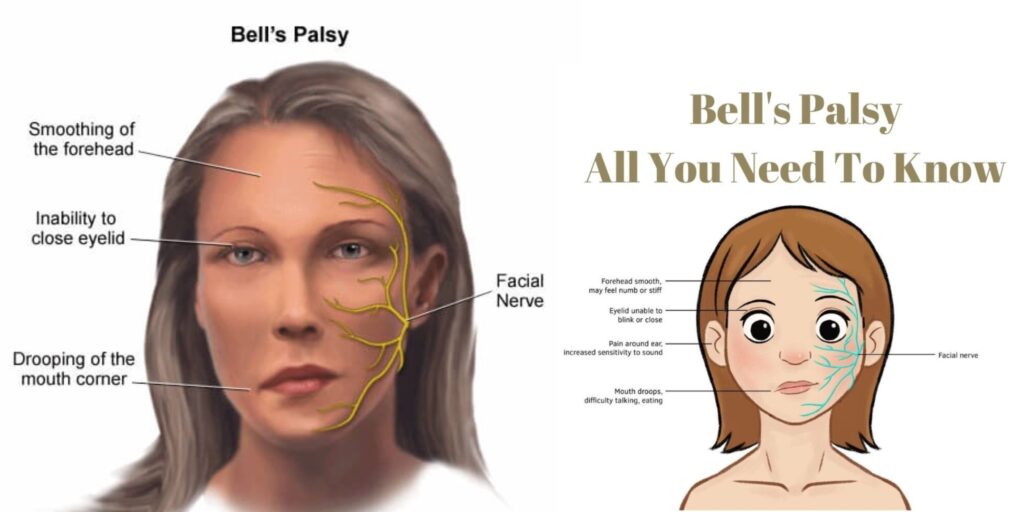
Have you ever woken up with one side of your face feeling numb or droopy? If so, you might have experienced a condition called Bell’s palsy — a temporary facial paralysis that can be frightening, but is often treatable and reversible.
In this blog, we’ll walk you through what Bell’s palsy is, what causes it, the symptoms to look out for, and how you can recover from it.
What Is Bell’s Palsy?
Bell’s palsy is a sudden weakness or paralysis of the facial muscles, typically affecting only one side of the face. It happens when the facial nerve (cranial nerve VII), which controls muscles of facial expression, becomes inflamed or compressed.
Because of this, people with Bell’s palsy may find it hard to smile, close their eye, or even blink on the affected side of the face. The symptoms can develop quickly — often within hours or overnight.
What Causes Bell’s Palsy?
While the exact cause of Bell’s palsy is not always known, it is often linked to viral infections. The most common trigger is the herpes simplex virus, the same virus that causes cold sores. Other viruses like Epstein-Barr (which causes mono), influenza, and even COVID-19 have also been associated with Bell’s palsy.
You may be at higher risk if you:
- Are pregnant (especially in the third trimester)
- Have diabetes
- Recently had a viral respiratory infection
- Have a family history of the condition
What Are the Symptoms of Bell’s Palsy?
Bell’s palsy can come on suddenly and usually affects just one side of the face. Common symptoms include:
- Sudden weakness or drooping on one side of the face
- Trouble closing one eye or raising one eyebrow
- Drooling
- Loss of taste on the front part of the tongue
- Increased sensitivity to sound in one ear
- Facial pain or discomfort near the jaw or behind the ear
These symptoms can look similar to those of a stroke, so it’s important to seek medical attention immediately for a proper diagnosis.
How Is Bell’s Palsy Diagnosed?
There’s no specific test for Bell’s palsy. Your doctor will usually diagnose it based on:
- Your symptoms
- A physical and neurological exam
- Medical history
- Ruling out other conditions like stroke, tumors, or Lyme disease
In some cases, an MRI or CT scan may be used to ensure nothing else is causing the facial paralysis.
READ MORE BLOG POSTS LIKE: Do’s and Don’ts in PCOD Diet Charts for Better Health
How Can You Treat and Recover From Bell’s Palsy?
Most people with Bell’s palsy start to recover within two weeks, and full recovery usually occurs within three to six months. Treatment focuses on reducing inflammation, protecting the eye, and supporting facial muscle movement.
Common treatments include:
- Corticosteroids (like prednisone): Help reduce inflammation and speed recovery
- Antiviral medications: May be used if a virus is suspected
- Eye care: Use eye drops, ointment, or an eye patch to prevent dryness and damage
- Physical therapy: Gentle facial exercises help keep muscles active and prevent stiffness
Home Care Tips for Faster Recovery
In addition to medical treatment, these home remedies can support healing:
- Apply warm compresses to the affected side of your face
- Massage the facial muscles gently
- Practice facial exercises (raising eyebrows, smiling, frowning)
- Eat soft foods if chewing is difficult
- Rest and stay hydrated
READ MORE BLOG POSTS LIKE: Hip Replacement Costs in the UK: What Are Your Options?
What’s the Outlook?
The good news is that 70% to 90% of people recover completely from Bell’s palsy, especially if they start treatment early. In rare cases, some may experience lasting weakness or facial muscle twitching.
Final Thoughts
Bell’s palsy can be a scary and sudden condition, but with prompt care and proper treatment, most people recover fully. If you or someone you know experiences symptoms of facial paralysis, don’t panic — but do see a doctor as soon as possible to get a clear diagnosis and start the healing process.
Disclaimer:
This blog is for informational purposes only and does not constitute medical advice. Always consult with a qualified healthcare professional for diagnosis and treatment of any medical condition. Do not ignore or delay seeking medical advice because of something you have read here.












